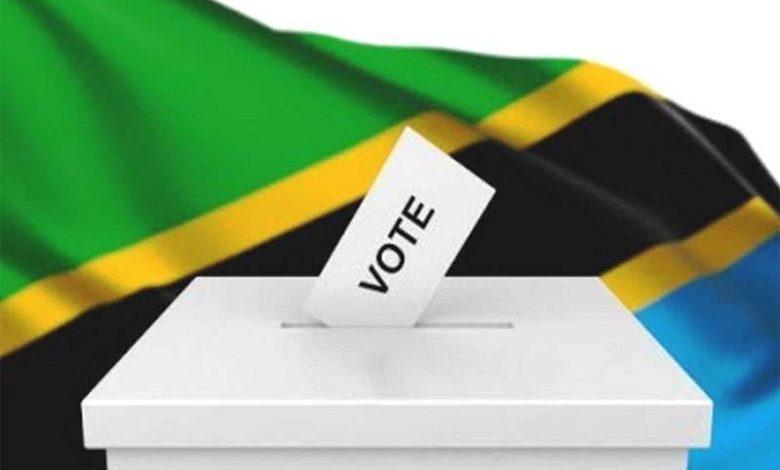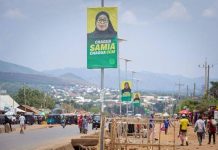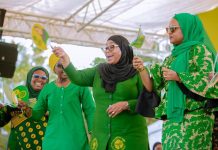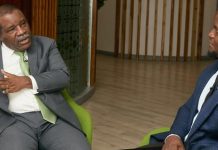Africa-Press – Tanzania. TRANSPARENCY and cooperation have emerged as the bedrock of preparations for the next General Election—which promises to be one of the country’s most significant democratic exercises.
The Independent National Electoral Commission (INEC), under the stewardship of Chairperson Justice Jacobs Mwambegele, has moved decisively to strengthen trust in the electoral process, engaging stakeholders at every level and ensuring that no critical decisions are taken in isolation.
Recently, when addressing political party leaders, civil society representatives, government officials and security agencies at a highlevel meeting in Dodoma this week, Justice Mwambegele underscored that the Commission’s approach to managing the election is rooted in openness and inclusivity.
“For instance, today we are meeting with you, Honourable Leaders of Political Parties and from July 30 to August 3, 2025, we will hold meetings with other election stakeholders,” he said, signalling an ongoing dialogue that will continue throughout the electoral period. His remarks were more than ceremonial.
They spoke to a wider strategy: building confidence in an electoral system that must accommodate a rapidly growing voter population, a complex political environment and a changing regional context.
According to the latest INEC data, a total of 37,655,559 Tanzanians have registered to vote in the upcoming elections—a 26.55 per cent increase from the 29,754,699 voters recorded in 2020.
This growth reflects a concerted effort by the Commission to reach more citizens, including previously marginalised groups.
Justice Mwambegele was quick to acknowledge the pivotal role political parties have played in shaping preparations for the elections.
“You have been quick to offer suggestions, share advice and seek clarification whenever needed during our meetings. We sincerely thank you for that,” he told party leaders, reaffirming the Commission’s commitment to inclusive decision-making.
The distribution of both digital and printed copies of the Permanent Voter Register and the list of polling stations to political parties, a first in Tanzania’s electoral history was widely praised.
Justice Mwambegele revealed that 7,641,592 new voters have been added to the Permanent Voter Register, representing an impressive 136.79 per cent of the initial target.
Additionally, 4,291,699 voters updated their information, achieving 98.23 per cent of the Commission’s projected figure.
These figures, he argued, reflect the public’s renewed faith in the electoral process and the effectiveness of INEC’s outreach efforts.
Breaking the numbers further, 36,650,932 voters are from Mainland Tanzania, while 1,004,627 voters are from Zanzibar.
Significantly, women constitute 50.31 per cent of the voter population, outnumbering men who account for 49.69 per cent, while 49,174 registered voters are persons with disabilities.
“This election is not just about numbers—it is about meaningful participation,” Justice Mwambegele emphasised.
“We are determined to ensure every registered voter can exercise their right in a credible and secure environment.”
INEC has expanded the number of polling stations to 99,911, up from 81,567 in 2020, an increase of 22.49 per cent. Of these, 97,349 stations will be in Mainland Tanzania and 2,562 in Zanzibar.
This expansion, Justice Mwambegele explained, aims to reduce congestion at polling stations, improve accessibility and enhance voter experience.
He clarified that 1,766 polling stations from the Zanzibar Electoral Commission register will also be used by INEC for Union elections in Zanzibar.
The 2025 elections will cover 272 constituencies—222 in Mainland Tanzania and 50 in Zanzibar— reflecting the addition of eight new constituencies.
At the local level, voters will elect councillors in 3,960 wards, following the creation of five new wards by the President’s Office – Regional Administration and Local Government.
In a bid to bolster credibility, INEC has authorised 88 institutions and civil society organisations to observe the 2025 elections—76 local and 12 international organisations.
These observers, Justice Mwambegele said, were approved after a rigorous verification process, ensuring that only qualified institutions with a proven commitment to impartiality and professionalism are involved.
Additionally, 164 institutions have been granted permits to provide voter education in accordance with the National Independent Electoral Commission Act No. 2 of 2024.
This dual focus on observation and education seeks to increase transparency while empowering voters with the knowledge they need to make informed choices.
Beyond the numbers and procedures, Justice Mwambegele’s tone conveyed a deeper message: elections are not a solitary endeavour.
They require collaboration between the Commission, political parties, civil society and citizens.
This spirit of cooperation was particularly evident during the recent voter registration update exercise, where political parties played an active role in mobilising voters and monitoring the process.
INEC officials were quick to credit this cooperation for the high registration turnout, noting that engagement with stakeholders has created a shared sense of ownership in the electoral process.
While progress has been made, challenges remain.
Ensuring logistical readiness for nearly 100,000 polling stations, training election officials and guaranteeing the security of voters and materials are complex undertakings. Yet Justice Mwambegele remains optimistic.
“We are taking deliberate steps to ensure the 2025 polls are free, fair, transparent and credible by guaranteeing a level playing field for all candidates and political parties,” he said.
Civic United Front Chairperson Prof Ibrahim Lipumba commended the move, calling it a landmark in promoting transparency.
“This is the first time the Commission is doing this. I congratulate INEC. It should also ensure fairness,” Prof Lipumba remarked.
Chairperson of the Political Parties Council, who also leads ADATADEA, echoed these sentiments and welcomed INEC’s decision to keep its offices open throughout the nomination period for presidential, parliamentary and councillor candidates.
He further urged the Commission to extend this directive to constituency and ward offices.
For More News And Analysis About Tanzania Follow Africa-Press







